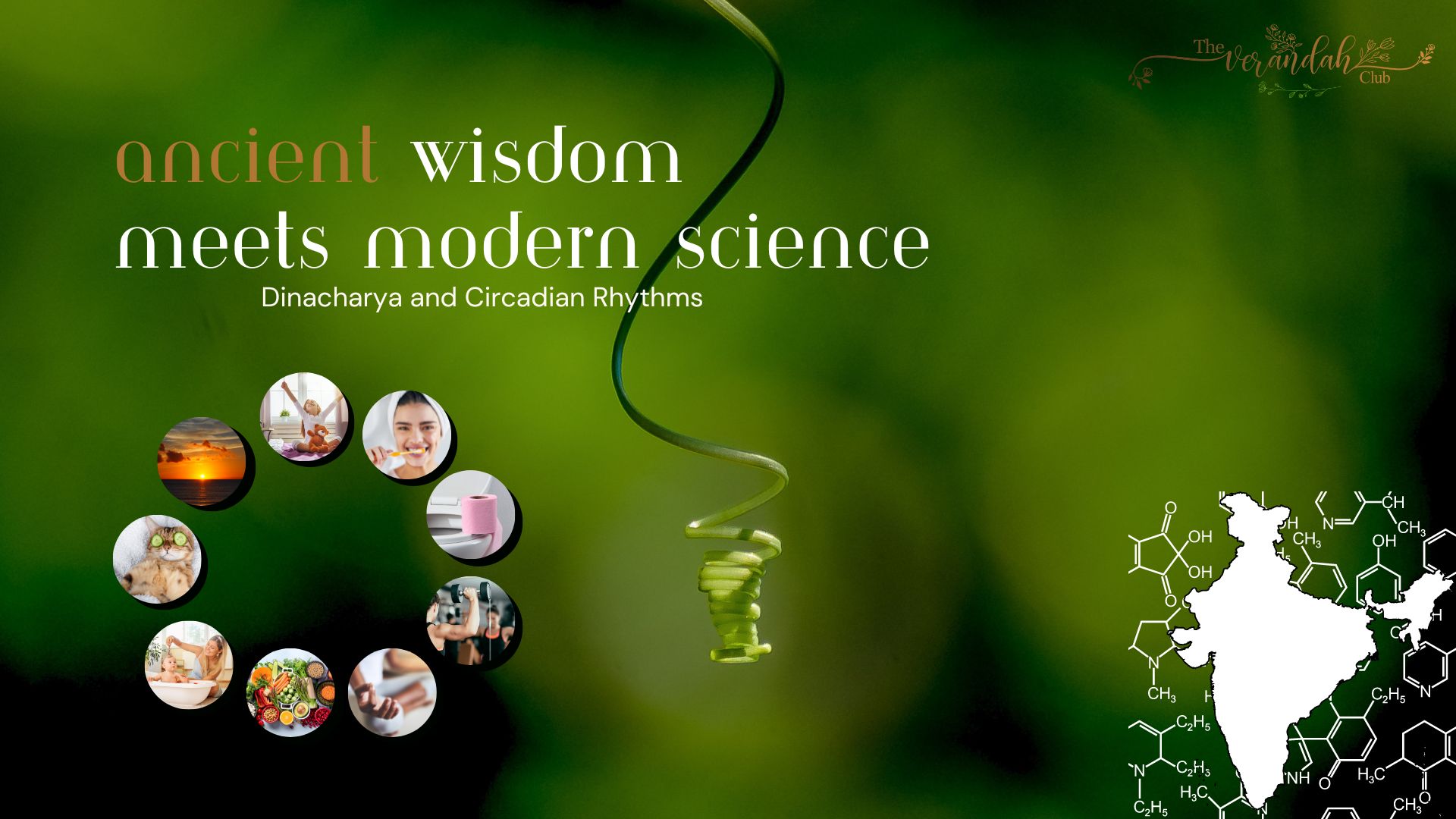
Dinacharya is a Sanskrit term that translates to "daily routine" in English. It is a fundamental concept in Ayurveda, the ancient system of medicine that originated in India and is closely connected to Hinduism. Dinacharya involves a set of daily practices and routines aimed at promoting physical, mental, and spiritual well-being by aligning one's activities with the natural rhythms of the day.
A typical Dinacharya includes various activities and practices, such as :
1. Waking Up Early: Rising before sunrise is encouraged as it is considered the most auspicious time for starting the day.
2. Oral Hygiene: Cleaning the mouth, tongue scraping, and oil pulling may be part of the morning routine for oral health.
3. Bowel Movements: Ayurveda places importance on regular and healthy bowel movements in the morning.
4. Physical Exercise: Engaging in physical activity or yoga to keep the body fit and flexible.
5. Meditation and Prayer: Taking time for meditation, prayer, or spiritual practices to cultivate inner peace and mental clarity.
6. Bathing and Personal Hygiene: Daily bathing and maintaining personal hygiene are essential.
7. Dietary Habits: Following a balanced and healthy diet according to one's constitution (Prakriti) and the season (Ritu).
8. Work and Rest: Organizing one's work and rest schedule to ensure productivity during the day and adequate sleep at night.
9. Evening Routine: Similar to the morning routine, there are specific practices for the evening, including winding down activities and relaxation techniques.
Dinacharya is personalized based on an individual's constitution (Prakriti) and imbalances (Vikriti) and is designed to maintain harmony with nature's cycles. Following a consistent Dinacharya is believed to support overall health, balance the doshas (biological energies), and promote spiritual growth in line with the principles of Ayurveda and Hinduism.
Sleep has been a topic of interest and significance in Hinduism, with various references and teachings associated with it. Here are a few aspects of sleep in Hinduism:
1. Daily Routine (Dinacharya): Hinduism emphasizes the importance of maintaining a balanced daily routine (Dinacharya), which includes adequate sleep. Getting proper rest is considered essential for physical and mental well-being as explained in the opening section of this article.
2. Yoga and Meditation: Hinduism gave birth to yoga and meditation practices, some of which are aimed at achieving deep states of relaxation and heightened awareness. Techniques like Yoga Nidra and meditation can improve the quality of sleep and lead to more profound spiritual experiences.
3. Dreams and Symbolism: Hindu scriptures, like the Upanishads and the Puranas, contain stories and discussions about dreams and their interpretations. Dreams are often seen as a reflection of one’s subconscious mind and can be used for self-reflection and understanding.
4. Ayurveda: Ayurveda, a holistic system of medicine closely tied to Hinduism, recognizes the importance of sleep for physical and mental health. It offers guidance on sleep patterns, including recommendations for the best times to sleep and wake up.
5. Temples and Sleep: In some Hindu temples, deities are put to rest at specific times, and rituals are performed to symbolize their sleep. For example, the deity may be taken to a special resting chamber within the temple, this ritual in Tamil is referred to as the Palliyarai Poojai - Procession and Arati performed at night in Shiva temples while The Lord is going for a Divine rest.
6. Spiritual Experiences: Some Hindu saints and yogis claim to have had profound spiritual experiences during deep meditation or while asleep. These experiences are often considered significant in their spiritual journeys.
Overall, sleep in Hinduism is viewed as an essential aspect of a balanced and healthy life, with connections to physical, mental, and spiritual well-being. It is integrated into various aspects of daily life and spiritual practice.
Circadian rhythms are innate biological cycles that regulate various physiological and behavioural processes in living organisms over a 24-hour period. These rhythms are influenced by external cues, such as light and darkness, and play a crucial role in maintaining the body's balance and health.
While circadian rhythms are primarily a biological concept and not a specific aspect of Hinduism, there is a connection between the daily routines and lifestyle practices in Hinduism, as discussed earlier in the concept of "Dinacharya," and the natural circadian rhythms.
In Hinduism, there is an emphasis on aligning one's daily activities with the natural cycles of day and night. For example:
1. Rising Early: Hindu practices often encourage waking up before sunrise, which corresponds to the natural light-dark cycle and helps individuals sync with their circadian rhythms.
2. Meditation and Prayer: Many Hindu spiritual practices, such as morning meditation and prayers, are conducted at specific times, often coinciding with sunrise or sunset.
3. Dietary Patterns: Ayurvedic dietary guidelines in Hinduism recommend specific meal timings that can align with the body's natural digestive rhythms.
4. Work and Rest: Hinduism encourages a balance between work and rest, with daytime activities and nighttime rest in accordance with the circadian cycle.
While the concept of circadian rhythms as understood in modern biology may not have been explicitly discussed in ancient Hindu texts, the overarching principle of living in harmony with nature's rhythms is in line with the holistic approach to health and well-being found in Hindu philosophy and practices. This alignment with nature's cycles is believed to promote physical and mental health, which is an integral part of the Hindu way of life.
NEXT ARTICLE

The Venkateshwara Swami Temple in Tirupati is among the holiest places in the world for Hindus. Millions of people throng the temple every year to get...

It is a sad reality that our Itihasa and Puranas have been subject to severe distortion over the years. This is not surprising considering how even th...

The holy land of Bharat follows Sanatana Dharma. The word Sanatana Dharma is a Sanskrit word meaning, “Eternal law”. It is the indestructible ultimate...